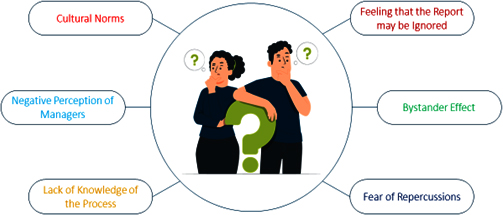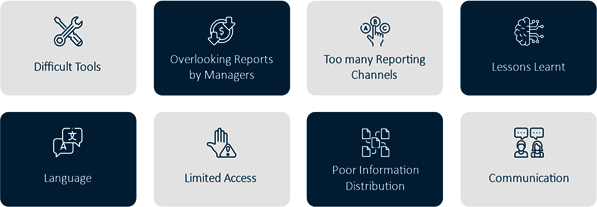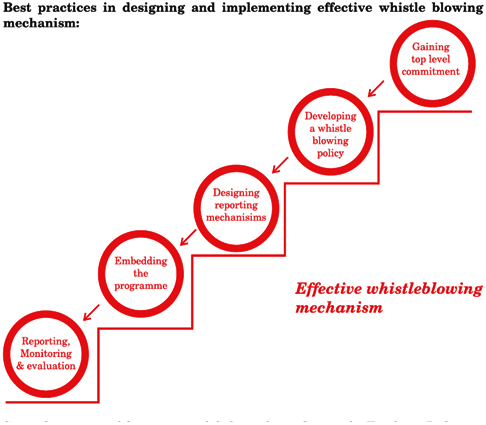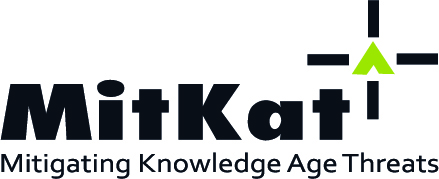
Col. Avijit Nandi (Retd.), Head-Integrated Risk Management & Investigation/ Fraud, MitKat
Introduction
Whistleblowing is not a new phenomenon as many thinks. The concept and its use have been there for ages. Two quotes below from Kautilya, the famous scholar and one of India’s most popular presidents Dr. A. P. J. Abdul Kalam echo the sentiment. In fact, we turn whistle-blowers in our school, colleges, and even in our families. The only difference is the motive in each case.

“Where do the evils like corruption arise from? It comes from the neverending greed. The fight for a corruption-free ethical society will have to be fought against this greed and replaced with ‘what can I give’ spirit”
– Dr. A. P. J. Abdul Kalam
Here we will broadly discuss ‘Whistle Blowing’ in the workplace. Every organisation encourages honest employees. Encouraging whistle-blowing in an organisation promotes transparent, clear, and effective communication means. An ethical person who thinks of the betterment of the society and organisation he serves will resort to whistle-blowing. Whistle-blowing in recent years has gained huge prominence since in the global competitive market, a company’s effort to be ahead in the race cut corners illegally, which gets reported. There have been instances of huge and big whistle-blowing by the employees against the companies. There are seven dimensions of organisation culture that can influence the employees to be a whistleblower.

“Any witness who supplies data about extortion and on the off chance that he/ she prevails with regards to demonstrating it will get the reward of onesixth of the sum being referred to; or if the source is an administration worker, he/ she might get one-twelfth of the sum for a similar demonstration”
– Kautilya
- Vigilance.
- Engagement.
- Credibility.
- Accountability.
- Empowerment.
- Courage.
- Option.
Who is a Whistleblower?
A whistleblower is a person, often an employee but also can be a supplier, vendor, or any third party, who reveals information about activity within a private or public organization that is deemed illegal, immoral, illicit, unsafe, or fraudulent. Study shows there are four type of factors that can influence a whistleblower’s intention to conduct whistleblowing, namely – pressure/ incentives, opportunity, rationalization, and capability.
Types of Whistleblowers

The need for effective whistle-blowing systems
The value of whistle-blowing cannot be overstated. Studies have shown ‘the single most important way in which wrongdoing was brought to light in public sector organizations’ was employee whistle blowing. There is accordingly no doubt that more needs to be done by legislators as well as public and private entities to encourage whistle-blowing and related reports of corruption – to handle reports of alleged corruption, wrongdoing and undue risks in a sound manner; and to provide appropriate levels of protection for whistle-blowers. Whistle-blowing systems can be more successful if they provide a combination of reporting channels (e.g., directly to specific trusted persons, via a telephone hotline, or through an online channel, or an app); if the authorities make a point of communicating with whistle-blowers throughout the investigation process to maintain trust (a failure to be responsive may give rise to a perception that the wrongdoing is being covered up or that the investigation is not serious); and if information from reports is connected with information from other sources (such as surveys and audits). For that reason, supporting whistleblowing inside the organszation may be highly beneficial for companies. If misconduct is reported, the perpetrators can be stopped, and more importantly, the damage their actions have caused can be mitigated or even prevented.
It is often hard for employees to decide to report misconduct. We will explore in detail different reasons employees fail to report transgressions. This does not mean that companies should be discouraged, as there are ways for them to encourage whistleblowing. It starts with implementing an anonymous whistleblowing system and making it a big part of the company’s culture. We will analyse different options, their advantages and disadvantages, and how to begin implementing them. Encouraging people to speak up and expose wrongdoing is a major factor in fighting fraud, corruption and unethical behaviour. The mere presence of a whistleblowing system may be enough to put people off committing any illegitimate activity, thus significantly reducing the risk of fraud.
Take a look at six crucial benefits that whistleblowing can bring to any organisation:
- Helps combat fraud.
- Avoids reputational damage.
- Prevents issues escalating.
- Reduces losses.
- Raises awareness.
- Creates an open culture.
Barriers to whistle-blowing
According to research, whistleblowing is beneficial for companies. For example, companies that receive a higher number of whistleblowing reports tend to have a plethora of positive outcomes such as a 46% decrease in negative news coverage or a 2.8% increase in return on assets to mention a few. However, this study found that 56% of employees chose not to report misconduct. Other studies show even more alarming numbers. One EU study found out that 81% of Europeans did not report the corruption even when they were aware of whistleblowing is beneficial for companies, but employees tend not to report misconduct. To be able to provide the solution, we first need to understand the problem. Why don’t people report misconduct more often?
Barriers on the employer’s side
One of the most prominent obstacles to the introduction of whistleblowing in companies is the negative perception by managers. Whistleblowing is perceived less as an improvement tool and more as telling on someone. Culture plays a role in this perception. For example, in the US, employees are three times more likely to report than in Europe. Also, the United Kingdom has the highest reporting rates in Europe.
Additionally, managers often believe that there is no need for a reporting system as they have an open company culture that nurtures whistleblowing. However, the data paints a different picture. A survey by the consulting company EY found that 56% of those who witnessed misconduct in the company did not report it. However, 73% of these people reported that they would consider reporting to an external party, such as a lawyer.
Barriers on the employees’ side
There are many reasons employees do not report transgressions. However, we can identify a few key ones that can, in turn, provide us with a better picture of the issue. It is important to note that the decision not to report misconduct is often caused by a combination of reasons, not just a single one. This, in turn, means that you should be able to address all of the reasons as well in order to make whistleblowing easier.

Reporting Mechanism
Most reputed and famed companies in India have a whistle blowing in place however, their effctiveness and implementation remains a doubt. The reporting mechanism if optimally utlised can be a potent tool for investigation. There is no organisation where there is nothing to report. Unfortunately, reporting mechanism exist in black and white as per government regulations in organisations without being exercised. The intent to utlise the tool and take actions acordingly has to flow from the top a mangement to get a desired result.
Yet the reporting mechanism fails in organisations due to the factors as shown below:

Methods and channels for whistle-blowing
As insiders to an organization, whistle-blowers have specific knowledge, access and expertise which allow them to detect corruption or other matters of concern that might otherwise remain hidden. However, they are often in a difficult situation owing to their possible loyalty to colleagues and supervisors, contractual confidentiality obligations, and the risk of retaliation. A distinction can be made between open, confidential, and anonymous forms of reporting.
Open reporting: Where individuals openly report or disclose information, or state that they do not endeavour to ensure or require their identity to be kept secret.
Confidential reporting: Where the name and identity of the individual who disclosed information is known by the recipient, but will not be disclosed without the individual’s consent, unless required by law.
Anonymous reporting: Where a report or information is received, but no one knows the source.
In addition to these different forms of reporting, there are also different channels through which to report. The three main reporting channels are: 1) internal reporting; 2) external reporting to a regulator, law enforcement agency, or other specific authority, and 3) external reporting to the media or another public. Alternative reporting channels should, in principle, be available to any person working in a public or private organization.
Whistleblower Protection
Different jurisdictions define whistleblowing differently. One clear distinction is the eligibility criteria for protection. For example, some countries such as Argentina, Bosnia and Herzegovina and the United States, provide protection regardless of whether the reporting person is a public or private sector employee, while other countries have more limited scopes of protection. Some countries protect only formal employees while others also include contractors, consultants, and volunteers. Whistle-blower protection is crucial for the success of anti-corruption detection and enforcement and should be a key aspect of any whistle-blowing system. Owing to the substantial benefits to the parties involved in corruption, and the serious threat of criminal and other punishments to which these parties are exposed, persons who report these corrupt activities can put themselves, family members and colleagues at risk. Instead of admitting to corruption and mending their ways, persons implicated in corruption can choose to attack or retaliate.
There are many other examples, including those of individuals who do not have the resources to survive without income or the ability to change jobs or careers. Retaliation against whistle-blowers is a serious threat to effective anti-corruption programmes, and it harms individuals and their livelihoods. In certain cases such as when whistle-blowers are unjustifiably dismissed or discriminated against gender or sexual orientation, retaliation can amount to a violation of human rights. Hence, a vital component of any plan to handle corruption reports is developing a protocol for maintaining confidentiality and protecting the people who report corruption Whistle-blower protection is crucial for the success of anti-corruption detection and enforcement and should be a key aspect of any whistle-blowing system. Owing to the substantial benefits to the parties involved in corruption, and the serious threat of criminal and other punishments to which these parties are exposed, persons who report these corrupt activities can put themselves, family members, and colleagues at risk. Instead of admitting to corruption and mending their ways, persons implicated in corruption can choose to attack or retaliate.
Whistle-blowing Protection in India
The Whistle Blowers Protection Act 2014 (Whistle Blower Protection Act). This Act provides for a legal mechanism for the reporting of illegal, unethical, and illegitimate practices by members of an organisation. However, the scope of the Act is limited to public servants and public sector undertakings. Further, the Companies Act 2013 (Companies Act), which mandates for the incorporation of a whistleblower policy, but primarily only by:
- Listed companies.
- Companies that accept deposits from the public
- Companies that have borrowed money from banks.
- Public financial institutions totalling more than 500 million Indian rupees.
To date, there are no specific laws dealing with the protection of whistleblowers applicable to private, unlisted companies or unincorporated entities and their employees. Employers are free to formulate and adopt a whistleblower policy to encourage employees (or any other person for that matter) to report matters without the risk of subsequent victimisation, discrimination, or disadvantage – economic or otherwise. Accordingly, for private establishments, the whistleblowing regime remains largely discretionary, and policy driven.
Key points
- India has not yet adopted laws to improve the protection of whistleblowers across sectors or levels in the economy, and establish adequate secure channels or mechanisms to enable whistleblowers to report without fear of disclosure, retaliation, or victimisation. As per the Whistle Blower Protection Act, notwithstanding any law in force, the competent authority will be required to conceal the identity of the complainant and the documents or information furnished by him for enquiry, unless so decided otherwise by the competent authority itself or it becomes necessary to reveal or produce the same under an order of a competent court.
- Any person who negligently or with a mala fide intention reveals the identity of a complainant will be punished with imprisonment for up to three years and a fine of up to 50,000 rupees.
- The Indian Companies Act does not impose any obligations on international employment to whistleblowing – a special or distinct committee or channel must be created for receiving and handling disclosures, giving the whistleblowing mechanism a separate institutional framework; the reporting mechanism should be systematic, simple, and straightforward to facilitate an early and easy disclosure of any wrongdoing. The procedure for disclosure must be easily comprehensible and should be accessible by all.
- For the employees or individuals associated with the organisation; the policy should provide adequate assurances and comfort regarding confidentiality of the identity of the whistleblower, continuity of association with the organisation, and the steps that the organisation will take to ensure that the whistleblower is not victimised, discriminated against, or adversely impacted in any manner according to the disclosure (include ing facilitating legal assistance at the organisation’s cost, if necessary).
- The policy should ensure that no action will be taken against whistleblowers who make disclosures in good faith and even allow for anonymous reporting; and the identification of what matters may be reported under the policy, the persons against whom such matters can be reported, the process that should be followed by the organisation, remedial measures, details of persons with whom reported information will be shared, and an overview of the mechanism for protecting whistleblowers and persons cooperating with an investigation, etc., the committing of or an attempt to commit an offence under the Prevention of Corruption Act 1988 by a public servant.
- As per the Whistle Blower Protection Act, if any person believes they are being victimised because they filed a complaint, made disclosures, or rendered assistance in an inquiry under the Act, they may apply to the competent authority (as may be designated or appointed under the Whistle Blower Protection Act) seeking protection. The authority may take such action, as appropriate, and give suitable directions to the concerned public servant or the public authority (including the jurisdictional police to protect such person from being victimised or to avoid such victimisation).
Scope of the protection
While the Whistle Blower Protection Act does not define the specific scope of protection that may be provided to the complainant, the competent authority has a wide range of powers to take such action, as it deems fit, depending on the facts and circumstances of each case, and may give suitable directions to the concerned public servant or the public authority (including the jurisdictional police) to protect the whistleblower or witnesses.
However, the competent authority is not empowered to impose civil or criminal sanctions against perpetrators for any sort of physical harassment or attacks on whistleblowers.
What are the support measures attached to the status of the whistleblower?
The Whistle Blower Protection Act and Companies Act do not prescribe any support measures to the status of whistle-blowers anti-retaliation policy is the bare minimum. Ensure that your stance on retaliation is encoded in official company policy, and accessible to all employees on your company intranet or ethics portal. Then, make sure that everyone knows about it. You may already run awareness campaigns for your hotline.
MitKat Faceup

Main Features
MitKat has collaborated with one of the best reporting apps in the world. The following are the reasons why you should use MitKat -FaceUp app.
- Is available 24/7 and perfectly secured.
- Does not require registration or advanced IT knowledge.
- Allows anonymous reporting.
- Allows the investigator to communicate with the whistleblower.
- Is opened to third parties (suppliers, business partners)
- Securely archives notifications for the legal period of 10 years is available 24/7 and perfectly secured.
Reporting form for whistleblowers
- Anyone can send a report in just 2 clicks.
- Attachments (Up to 5MB).
- Anonymous whistleblowing.
- Link to other channels.
Report management
- Two-way communication with whistleblower.
- Allocating assignees, entering internal comments, setting report priority and your own labels.
- Manually add reports.
Reporting channels
- Completely customizable reporting forms.
- Telephone hotline.
Easy setup and user-friendly interface
- Organisational structure.
- Add your team members and decide which report each individual member will manage.
- Automatic due date.
- E-mail notifications.
Data analytics
- Clear visualisations and analysis.
- Simple data exporting and printing.
- Activity log.
Conclusion
The whistleblowing policy is a must in all organizations, whether big or small, to prevent misconduct and uphold the interests of all stakeholders, internally or externally. It needs to maintain anonymity to encourage the whistleblowers to act when they see wrongdoing. Furthermore, by adopting an efficacious whistleblowing structure an organization or company can ensure to dissuade employees from indulging in unlawful activities. It would also enable the organization or the company to detect any wrongdoing in advance. Whistleblowing is central to a company’s system of checks and balances. Whistleblowing shields companies from reputational and other risks. The ability to blow the whistle reflects shared responsibility and positive culture.
*Views expressed in the article are solely of the Author
